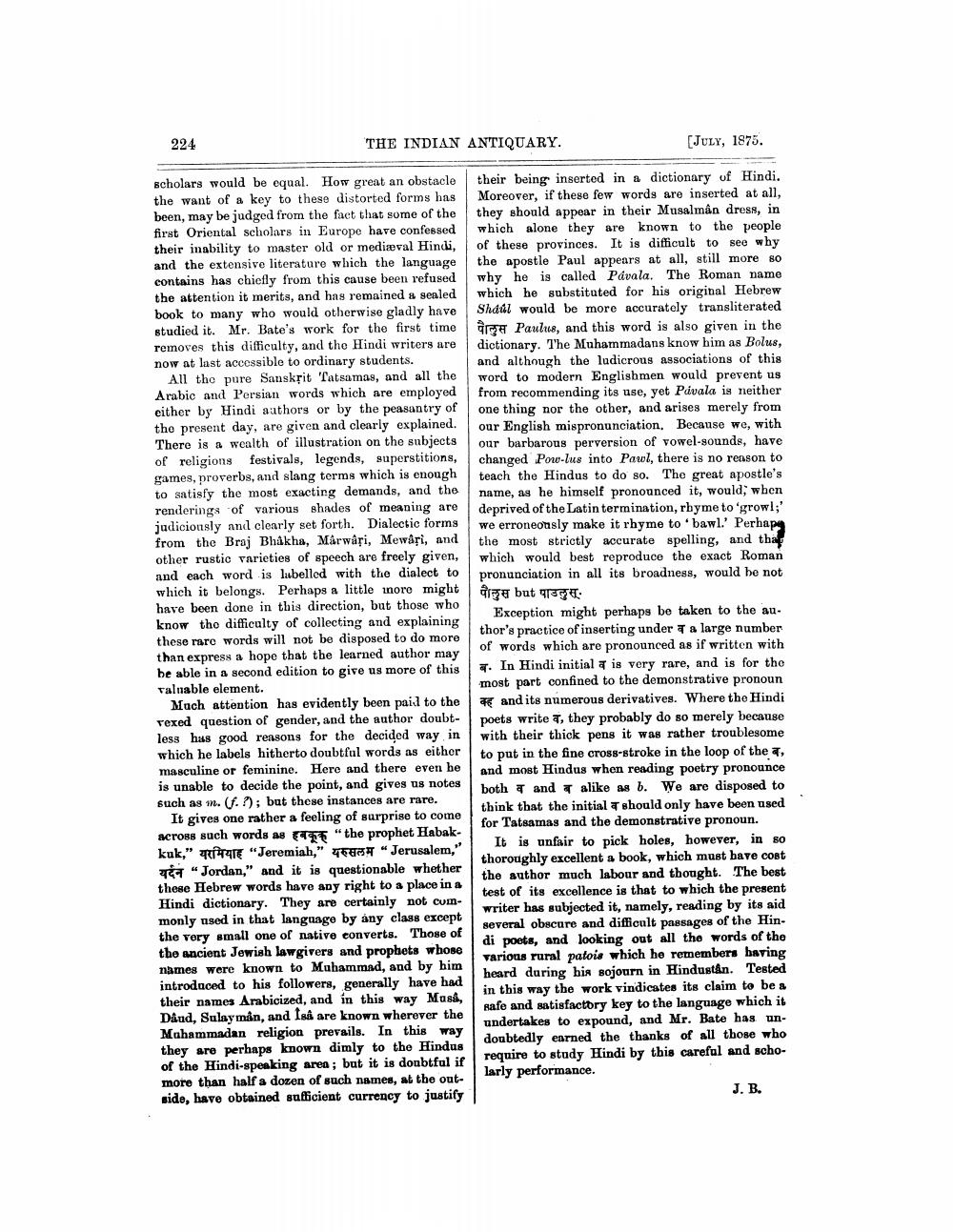________________
224
THE INDIAN ANTIQUARY.
(JULY, 1875.
scholars would be equal. How great an obstacle the want of a key to these distorted forms has been, may be judged from the fact that some of the first Oriental scholars in Europe have confessed their inability to master old or mediæval Hindi, and the extensive literature which the language contains has chiefly from this cause been refused the attention it merits, and has remained a sealed book to many who would otherwise gladly have studied it. Mr. Bate's work for the first time removes this difficulty, and the Hindi writers are now at last accessible to ordinary students.
All tho pure Sanskrit Tatsamas, and all the Arabic and Persian words which are employed either by Hindi authors or by the peasantry of the present day, are given and clearly explained. There is a wealth of illustration on the subjects of religions festivals, legends, superstitions, games, proverbs, and slang terms which is enough to satisfy the most exacting demands, and the renderings of various shades of meaning are judiciously and clearly set forth. Dialectic forms from the Braj Bhakha, Marwari, Mewari, and other rustio varieties of speech are freely given, and each word is labelled with the dialect to which it belongs. Perhaps a little inoro might have been done in this direction, but those who know the difficulty of collecting and explaining these raro words will not be disposed to do more than express a hope that the learned author may be able in a second edition to give us more of this Talnable element.
Mach attention has evidently been paid to the rexed question of gender, and the author doubtless has good reasons for the decided way in which he labels hitherto doubtful words as either masculine or feminine. Here and there even be is unable to decide the point, and gives us notes such as m. (f.?); but these instances are rare.
It gives one rather a feeling of surprise to come across such words as 794 "the prophet Habakkuk," RATATE "Jeremiah," Th " Jerusalem," 469"Jordan," and it is questionable whether these Hebrew words have any right to a place in a Hindi dictionary. They are certainly not cummonly used in that language by any class except the very small one of native converts. Those of the ancient Jewish lawgivers and prophets whose names were known to Muhammad, and by him introduced to his followers, generally have had their names Arabicized, and in this way Musa, Daud, Sulaymån, and Isa are known wherever the Muhammadan religion prevails. In this way they are perhaps known dimly to the Hindus of the Hindi-speaking area; but it is doubtful if more than half a dozen of such names, at the outside, have obtained sufficient currency to justify
their being inserted in a dictionary of Hindi. Moreover, if these few words are inserted at all, they should appear in their Musalman dress, in which alone they are known to the people of these provinces. It is difficult to see why the apostle Paul appears at all, still more so why he is called Pavala. The Roman name which he substituted for his original Hebrew Shaal would be more accurately transliterated Age Paulus, and this word is also given in the dictionary. The Muhammadans know him as Bolus, and although the ludicrous associations of this word to modern Englishmen would prevent us from recommending its use, yet Pávala is neither one thing nor the other, and arises merely from our English mispronunciation. Because we, with our barbarous perversion of vowel sounds, have changed Powo-lus into Pawl, there is no reason to teach the Hindus to do so. The great apostle's name, as he himself pronounced it, would, when deprived of the Latin termination, rhyme to growl;' we erroneonsly make it rhyme to 'bawl.' Perhaps the most strictly accurate spelling, and that which would best reproduce the exact Roman pronunciation in all its broadness, would be not पौलुस but पाउलुसू.
Exception might perhaps be taken to the au. thor's practice of inserting under a large number of words which are pronounced as if written with 7. In Hindi initial is very rare, and is for the most part confined to the demonstrative pronoun
and its numerous derivatives. Where the Hindi poets write T, they probably do so merely because with their thick pens it was rather troublesome to put in the fine cross-stroke in the loop of the , and most Hindus when reading poetry pronounce both and T alike as b. We are disposed to think that the initial should only have been used for Tatsamas and the demonstrative pronoun.
It is unfair to pick holes, however, in so thoroughly excellent a book, which must bave cost the author much labour and thought. The best test of its excellence is that to which the present writer has subjected it, namely, reading by its aid several obscure and difficult passages of the Hindi poets, and looking out all the words of the various rural patois which he remembers having heard during his sojourn in Hindustan. Tested in this way the work vindicates its claim to be a safe and satisfactory key to the language which it undertakes to expound, and Mr. Bate has undoubtedly earned the thanks of all those who require to study Hindi by this careful and scholarly performance.
J. B.




